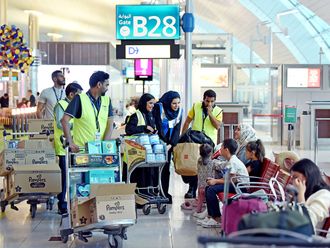Abu Dhabi: A slumping economy and growing political uncertainty is holding back Turkish Aerospace Industries (TAI) from going to the market.
Muharrem Dortkasli, President and chief executive, said that the events of the last six months led to the Turkish-government backed defence and aerospace manufacturing company holding off on the initial public offering (IPO).
Dortkasli spoke to Gulf News at the Global Aerospace Summit in Abu Dhabi on Tuesday.
TAI planned on floating at least 25 per cent of its shares on the Istanbul bourse in the first quarter but now says the time is not right. The Turkish lira (TL) is continuing to drop against the dollar and is sitting around TL 2.1.
The economy began to slump roughly six months ago when protests erupted in Istanbul and spread across the country. The economy has continued to struggle in response to corruption allegations against the government.
Two thirds of TAI revenue comes from its export programme and in 2013 the company pulled in almost $1 billion (Dh3.67 billion) in revenue, Dortkasli said. He would not say how high — or low — its profit margin is (but insists there is one) because he does not want to influence the company’s share value when it does decide to finally go to the market.
“As a company we have decided to find better market conditions [to list in]. We didn’t cancel it (IPO), we put it in the in the hold position, we are in standby … so when we find an appropriate slot we will push the button,” Dortkasli said.
Bullish
The Turkish Armed Forces Foundation holds 55 per cent of TAI shares with the Undersecretary for Defence Industries of the Ministry of Defence holding the rest.
The company had previously looked at holding an IPO in 2012 and 2013.
But Dortkasli said the Turkish economy is not hurting TAI’s production. He is bullish on 2014 and said the company will grow off the back of existing contracts for the next ten years even if it does sign any new deals over the same period.
“There is a firm commitment on the military programs we have signed,” he said.
In revenue, the company is growing on the civilian side where its partnerships include Airbus and Boeing. Dorkasli said that the company’s business is roughly split 50-50 between civilian and military, despite the military arm delivering just a third of revenue.
TAI says it is currently in the final stages of the contract discussions to supply military equipment to a number of GCC states.












